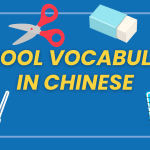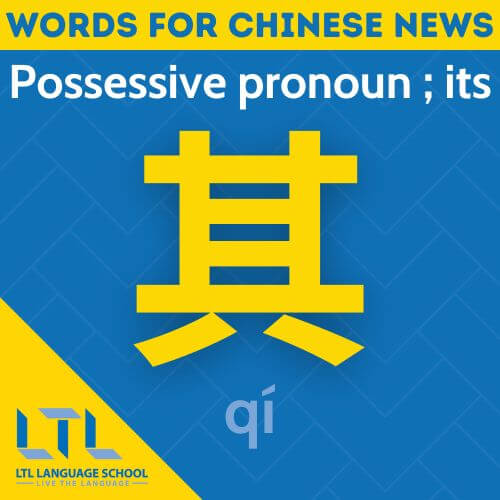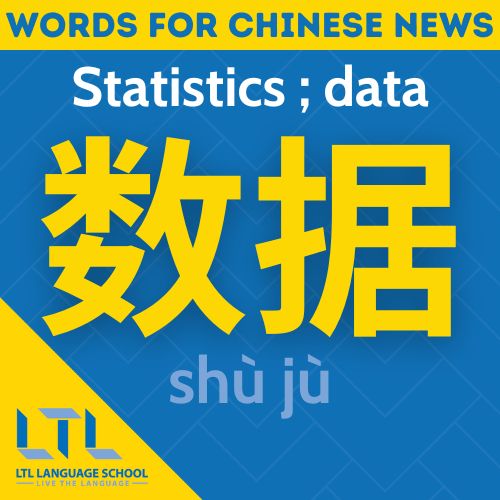Struggling to Comfortably Consume Chinese News? Here are 10 Must-Know Words to Boost Mandarin News Comprehension
This is a guest blog post from mylingua, an AI tool that helps you learn Chinese immersively through real news articles
Most of us learn Chinese to dive into a new and exotic culture, understand its people and their stories, and stay up to date with what’s going on. Reading the news is a big part of that.

But unfortunately, there is a major “roadblock” – understanding the news is really difficult.
Despite years of study, the universe of real Chinese news still seems way out of reach for most of us.
Fear not! In this blog post…
We’ll introduce you to ten high-frequency news words that will help you navigate this complex world and that will boost your comprehension the next time you read.
Ten words alone of course won’t solve the problem, but consider this a solid starting point. We have many other useful lists waiting for you and included three bonus words 😉
To make this list as relevant as possible for you, we made sure that all example sentences are real news headlines and added some criteria on top of frequency:
1) All words are words you don’t usually come across in spoken language or the classroom until at least HSK 4.
2) All words are “grammar” words” (prepositions, conjunctions, etc.).
So this list is most useful for upper beginners but should also include some nuggets for intermediates. It will definitely help you take your Chinese news comprehension to the next level.
Let’s get going!
Chinese news words || How mylingua can help
Chinese news words || 将 (jiāng)
Chinese news words || 与 (yǔ)
Chinese news words || 以 (yǐ)
Chinese news words || 并 (bìng)
Chinese news words || 而 (ér)
Chinese news words || 及 (jí)
Chinese news words || 于 (yú)
Chinese news words || 至 (zhì)
Chinese news words || 其 (qí)
Chinese news words || 之 (zhī)
Chinese news words – bonus || 数据 (shù jù)
Chinese news words – bonus || 同比 (tóng bǐ)
Chinese news words – bonus || 分析 (fēn xī)
Chinese news words || FAQs
Chinese News Words || How mylingua can help
Knowing that many passionate learners struggle with the problem of consuming Chinese news, we at mylingua were burning to find a solution.
It led us to create an AI tool to help you understand real Chinese news much earlier than you normally could.
A handy by-product of our data-driven approach is our continuously increasing data set of now more than two million current articles.
It gives us deep insight into news language and allows us to build deep and up-to-date news frequency lists. Quick refresher, a frequency list is a list of words sorted by how often each word appears in a body of text. 的, for example, is the first word in our frequency list because it is the most used word in the news.
Chinese News Words – 将 (jiāng)
- HSK: none
- Current news frequency rank: 14
- Equivalent in spoken language: 会 (huì)
将 (jiāng) is mostly used to express the future in the Chinese news setting. This includes either announcements or reports on events/actions that are planned or expected to happen or to discuss predictions, plans, and future developments.
将 is often combined with other auxiliary verbs like 会 and 要. But that usually doesn’t really change the meaning.
Structure: Subject + 将 / 将要 / 将会 + [Verb Phrase]
News headline examples
两年后,苏州将举办中学生世界杯Liǎng nián hòu, Sūzhōu jiāng jǔbàn zhōngxuéshēng shìjièbēi
In two years, Suzhou will host the World Cup for middle school students
AfCFTA将促进非洲经济增长AfCFTA jiāng cùjìn Fēizhōu jīngjì zēngzhǎng
AfCFTA (African Continental Free Trade Area) will boost Africa’s economic growth

How To Memorize Chinese Characters // 8 Tips For Success
Learning Chinese is intimidating for many, but it’s not as bad as you think. We are going to reveal the top tips on how to memorize Chinese characters.
Chinese News Words – 与 (yǔ)
- HSK: 4
- Current news frequency rank: 15
- Equivalent in spoken language: 和 (hé) or 跟 (gēn) (Note: not for all its meanings)
与 (yǔ) can have various meanings such as “and”, “with”, “to” or “for”. In the context of news, it is often used to connect nouns or phrases, reporting on collaborations, partnerships, or joint efforts.
Structure: Subject + 与 + Subject OR [Subject] + 与 + [Object] + [Verb Phrase/Adjective].
News headlines example
韩国的酒文化与礼节Hánguó de jiǔ wénhuà yǔ lǐjié
Korean liquor culture and etiquette
玻利维亚宣布与以色列断交Bōlìwéiyà xuānbù yǔ Yǐsèliè duànjiāo
Bolivia announced breaking diplomatic relations with Israel


Chinese News Words – 以 (yǐ)
- HSK: 4
- Current news frequency rank: 37
- Equivalent in spoken language: 和 (hé) (Note: not for all its meanings)
以 (yǐ) has various meanings, but in the context of news, it is mostly used to either indicate the means and methods by which something is done or the reason or purpose of action (“by”, “by means of“, “with”).
Structure: 以 + [Verb Phrase]
News headline examples
以好剧本打造好剧Yǐ hǎo jùběn dǎzào hǎo jù
Create a good drama with a good script (Note: not for all its meanings)
印度公司同意以卢布购买俄罗斯石油Yìndù gōngsī tóngyì yǐ lúbù gòumǎi Éluósī shíyóu
Indian companies agreed to buy Russian oil in rubles (with the method of rubles)

Did You Know About Chinese Sign Language? A Guide to 中国手语
Did you know there was a Chinese Sign Language? Or did you think, like me, that sign language was universal? A simple guide to help you learn a thing or two
Chinese News Words – 并 (bìng)
- HSK: none
- Current news frequency rank: 42
- Equivalent in spoken language: 也 (yě)
并 (bìng) is used to connect clauses or sentences, emphasizing additional important information, key points, or important actions. It can be translated with “and,” “furthermore,” “in addition,” or “also”.
Structure: [Verb Phrase 1] + 并 + [Verb Phrase 2] OR [Clause 1] + 并 + [Clause 2].
News headline examples
欢迎更多国家支持并加入Huānyíng gèng duō guójiā zhīchí bìng jiārù
More countries are welcome to support and join
In other cases, 并 (bìng) can be used to emphasize something negative or deny a previous statement, often paired with 不 (bù) or 没有 (méiyǒu).
Structure: [Subject]. + 并 + 不 + [Verb Phrase / Adj.] OR [Subject] + 并 + 没(有) + [Verb Phrase].
全球化似乎并没有结束Quánqiúhuà sìhū bìng méiyǒu jiéshù
Globalization does not seem to have ended (at all)
历史数据或许并不能反映未来趋势Lìshǐ shùjù huòxǔ bìng bùnéng fǎnyìng wèilái qūshì
Historical data may not at all reflect future trends
Chinese News Words – 而 (ér)
- HSK: 4
- Current news frequency rank: 45
- Equivalent in spoken language: 但是 (dànshì)
而 (ér) is a conjunction that means “and,” “but,” “yet,” or “while.” It is often used to present contrasting information or differing perspectives on an issue or to show a transition from one idea to another.
Structure: [Clause 1], 而 [Clause 2].
News headline examples
了解真实而美丽的中国Liǎojiě zhēnshí ér měilì de Zhōngguó
Understanding the real and beautiful China
基辛格,复杂而传奇的一百年Jīxīngé, fùzá ér chuánqí de yī bǎi nián
Kissinger, a complex and legendary hundred years


Chinese News Words – 及 (jí)
- HSK: none
- Current news frequency rank: 62
- Equivalent in spoken language: 和 (hé) (Note: not for all its meanings)
及 (jí) means “and,” or “to reach,” or “to extend to.” It is often used to indicate inclusion or extension.
Structure: [Noun 1] 及 [Noun 2].
News headline examples
阿里巴巴发布Q4及全年财报Ālǐbābā fābù Q4 jí quánnián cáibào
Alibaba released its Q4 and full-year financial report
支持长江大保护及绿色发展Zhīchí Chángjiāng dà bǎohù jí lǜsè fāzhǎn
Support the main protection and green development of the Yangtze River

Tandem Language Learning 👬 How to Find and Study with a Language Partner
Tandem Language Learning // The key to mastering any language is of course to practice speaking. This is where a Language Tandem comes in.
Chinese News Words – 于 (yú)
- HSK: none
- Current news frequency rank: 72
- Equivalent in spoken language: 在 (zài)
You certainly already know 于 ’s spoken equivalent 在. Their meaning (in/at/on) and usage as a preposition are exactly the same for most situations.
Structure: [Subject] 于 [Time/Place/Direction/Comparison] + [Verb Phrase].
News headline examples
以色列将于下周与哈马斯重启谈判Yǐsèliè jiāng yú xià zhōu yǔ Hāmǎsī chóngqǐ tánpàn
Israel will resume negotiations with Hamas next week
Note: You might spot a few other words and their usage from this list in this sentence.
我国银行最早出现于唐朝Wǒguó yínháng zuìzǎo chūxiàn yú Tángcháo
China’s banks first appeared in the Tang Dynasty
Note: China is often referred to as 我国 (wǒguó) in news.
Chinese News Words – 至 (zhì)
- HSK: none
- Current news frequency rank: 88
- Equivalent in spoken language: 到 (dào)
至 (zhì) in a news context usually means “to” or “until”. It is used as a preposition to indicate reaching a point in time, or space and in relation to numeric values and numbers
Structure: 至 [To/End Point].
News headline examples
美国4月失业率升至3.9%Měiguó 4 yuè shīyèlǜ shēng zhì 3.9%
U.S. April unemployment rate rises to 3.9%
乌克兰征兵年龄 下修至25岁Wūkèlán zhēngbīng niánlíng xià xiū zhì 25 suì
Ukraine lowers the conscription age to 25

75 Useful Academic Vocabulary 🎓 Let’s Go back to School in Chinese
Thinking of coming to learn Chinese? Good! As a present, we are getting you ahead of the rest with our hugely useful set of Chinese school vocabulary.
Chinese News Words – 其 (qí)
- HSK: none
- Current news frequency rank: 90
- Equivalent in spoken language: 他/她/它的 (tā de)
其 (qí) is a possessive pronoun, similar to “its/her/his” or “their” in English. In news language, it is mainly used to reference or refer back to people, things, or entities such as organizations, countries, or individuals, ensuring clarity and avoiding repetition.
Structure: [Subject] + 其 + [Object/Action]
News headline examples
月球缩小或致其南极发生月震Yuèqiú suōxiǎo huò zhì qí nánjí fāshēng yuèzhèn
The shrinking of the Moon may cause moonquakes at its South Pole
中国及其邻国加强了合作Zhōngguó jí qí lín guó jiāqiángle hézuò
China and its neighboring countries have strengthened cooperation
Note: You might spot another word from this list in this sentence.
Chinese News Words – 之 (zhī)
- HSK: 4
- Current news frequency rank: 107
- Equivalent in spoken language: 的 (de)
之 (zhī) is a classical Chinese particle meaning “of,” “him,” “her,” “it,” or “them.” It is used to indicate possession, direction, or as a connector in literary and formal contexts. 之 is often used similarly to the possessive 的 (de)
Structure: [Noun 1] 之 [Noun 2].
News headline examples
中外学者共话汉字之美Zhōngwài xuézhě gòng huà hànzì zhī měi.
Chinese and foreign scholars talk about the beauty of Chinese characters
奥本海默之孙访广岛 吁废核武Àoběnhǎimò zhī sūn fǎng Guǎngdǎo yù fèi héwǔ.
Oppenheimer’s grandson visited Hiroshima and called for the abolition of nuclear weapons


Bonus Words
To add more color to this word list we added three non-grammar words. They’re all related to a topic you’ll come across in the news all the time: data.
Chinese News Words – 数据 (shù jù)
- HSK: 5
- Current news frequency rank: 76
数据 (shù jù) means “data” or “statistics.” In news, it mainly refers to quantitative information collected for analysis or reference.
News headline examples
历史数据或许并不能反映未来趋势Lìshǐ shùjù huòxǔ bìng bùnéng fǎnyìng wèilái qūshì
Historical data may not be indicative of future trends
Note: Can you spot the other word from this list?
数据不会骗人Shùjù bù huì piàn rén
Data doesn’t lie (lit. data does not deceive people)
Chinese News Words – 同比 (tóng bǐ)
- HSK: none
- Current news frequency rank: 113
同比 (tóng bǐ) is primarily used in statistical, financial, and economic contexts to compare data, figures, or statistics from the current period with the same period last year. A typical use case is the comparison of a month or quarter this year with the same month or quarter last year.
News headline examples
海上风电发电量同比增长34%Hǎishàng fēngdiàn fādiànliàng tóngbǐ zēngzhǎng 34%
Offshore wind power generation increased by 34% year-on-year
成都一季度GDP同比增长5%Chéngdū yī jìdù GDP tóngbǐ zēngzhǎng 5%
Chengdu’s GDP grew by 5% year-on-year in the first quarter (i.e. this Q1’s GDP is 5% higher than the Q1’s GDP of last year)
Chinese News Words – 分析 (fēn xī)
- HSK: 5
- Current news frequency rank: 495
分析 (fēn xī) means “to analyze” or “analysis.” It can be used as both a verb and a noun.
News headline examples
专家分析资本为何离开欧元区Zhuānjiā fēnxī zīběn wèihé líkāi Ōuyuánqū
Experts analyze why capital is leaving the eurozone
读博士的经济收益分析Dú bóshì de jīngjì shōuyì fēnxī
Analysis of the economic benefits of studying for a PhD


And that concludes our list of 13 powerful words to help you conquer Chinese news like a pro!
We hope these words add a spark to your learning journey. You can now go ahead and decode some news headlines to impress your friends and classmates with your new vocabulary. Remember, every word brings you one step closer to unlocking the vast and exciting world of Chinese media! 📰
Chinese News Words || FAQs:
How is news language different?
That of course depends, on what you compare it with (spoken language, other written language, etc.), the main differences are:
– Different (more formal and sophisticated) vocabulary compared to everyday spoken language.
– More complex sentence structure.
– Longer sentences. In many cases, whole paragraphs are made up of just one sentence.
More Technical words are specific to certain fields, such as economy, politics, science, etc. Those are often not (or only later) included in common learning material and thus make it more challenging to understand news
Why should I bother reading the news?
Reading Chinese news is one of the best ways to stay informed about the country, its culture, people, and trends. It can be a great advantage for connecting with other learners or native speakers, providing a common ground for even basic conversations. From a language learning perspective, regularly reading the news will have a great impact on your progress toward fluency. It helps you build the vocabulary necessary to go beyond basic conversations and boosts your understanding of complex sentence structures.
What is a frequency list?
It’s basically a compilation of words ranked according to how often they appear in a given “corpus” (large set of content). For this blog post, we analyzed two million authentic Chinese news articles to extract the most used words in the news.
Should I learn according to frequency lists?
Learning high-frequency words first will definitely help you progress faster because a wider range of content will be accessible to you sooner. It ensures that you spend your time and effort on the vocabulary that will give you the greatest boost in comprehension.
Additionally, the more frequent words, well, appear more frequently, which reinforces your learning of these words through repeated exposure. Seeing the same word over and over in different contexts also builds your awareness of how and where the word is used naturally.
However, frequency lists are just one, albeit important, tool in your toolbox that you need to supplement with others. If frequency lists play a large role in your learning setup, do make sure to get exposure to the words you learn in context-rich language, such as in a language course or with comprehensible input.
Will news language help me with written and spoken language?
Reading the news will have an impact on both your written and spoken language skills.
Next to the benefits mentioned in Q2, despite news language’s often formal character, many high-frequency words, technical terms, and phrases are used in written and spoken language. This will equip you with a broad range of options for formulating your opinions or statements and help you become familiar with different writing styles and thought patterns. It will also boost your understanding of references and idioms rooted in current events.
How do I say frequency rank in Chinese?
频率排名 (pín lǜ pái míng)
How do I say news etc. in Chinese?
In Chinese, news is 新闻 (xīn wén)
Want more from LTL?
If you wish to hear more from LTL Mandarin School why not join our mailing list.
We give plenty of handy information on learning Chinese, useful apps to learn the language and everything going on at our LTL schools!
Sign up below and become part of our ever growing community!
⭐ Download our free ebook, your starter pack of essential Mandarin learning resources!


 Hi, my name is Ilaria. I am from Italy and I am a Student Advisor at LTL. Fancy coming to study with us in China? Drop me a message.
Hi, my name is Ilaria. I am from Italy and I am a Student Advisor at LTL. Fancy coming to study with us in China? Drop me a message. Hi, my name is Mojca. I am from Slovenia in Europe and I work as a student advisor at our Shanghai school.
Hi, my name is Mojca. I am from Slovenia in Europe and I work as a student advisor at our Shanghai school.






